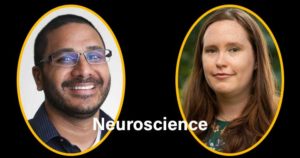UWM is offering a new neuroscience major for undergraduate students interested in the inner workings of the human brain.
Neuroscience is the study of the brain and nervous system. The new major draws on expertise of faculty from several departments across the College of Letters & Science and the university at large to expose students to new topics in learning and research.
To help develop this new avenue of study, two new faculty members joined the College of Letters & Science in January. Assistant professors Arun Asok and Caitlin Bowman specialize in various aspects of neuroscience and will be helping students learn in class and take part in new research labs and activities.
UWM undergraduates can construct a program of study that takes advantage of the many introductory level and graduate/undergraduate course offerings by our faculty. Each of the participating laboratories also offer opportunities for independent research.Undergraduate training in neuroscience is intended to prepare the student for graduate study or professional school in the life sciences.
Research by UWM neuroscience faculty is funded by grants from the National Institutes of Health and the National Science Foundation, as well as several private foundations and the private sector. Lines of inquiry include behavioral, cellular, cognitive, molecular, and systems neuroscience.
Arun Asok
Assistant professor, Psychology
PhD 2016, University of Delaware
Previously Postdoc at Columbia University
Research focus: How are learned and innate fears encoded by our brains? How can changes in our innate fear system influence how we learn about and remember new fearful experiences? Our laboratory uses a reductionist approach to decipher which brain networks, circuits, and genes control how we respond to learned and innate fears.
Research discoveries: My most recent discovery identified how a novel hard-wired circuit from one of the brain’s emotional memory centers (the ventral hippocampus) to the brain’s major stress center (the hypothalamus) controls the earliest moments of a fear response.
Fun fact: I worked in Information Technology (IT), almost completed a bachelor’s degree in finance, and owned a car detailing business prior to obtaining my BS and PhD in Neuroscience/Psychology.
Caitlin Bowman
Assistant professor, Psychology
PhD 2015, Pennsylvania State University
Previously Postdoc at University of Oregon
Research focus: The cognitive neuroscience of learning and memory.
Research discoveries: When learning a category, people tend to form a mental average of the category examples they have encountered in the past – for example, an average, perfect dog would represent the category of dogs. I have shown that a region of the brain typically thought to support memory for individual experiences, the hippocampus, also helps to form this category average.
Goals for the year: My goals for the current year are to prepare my lab for data collection, recruit lab personnel, and teach my first course.
Fun fact: I have a cat named Pantoufle, a dog named Grumbledore, and a 6-month old baby named Curran. During my post-doc in Oregon, I also kept backyard chickens.
